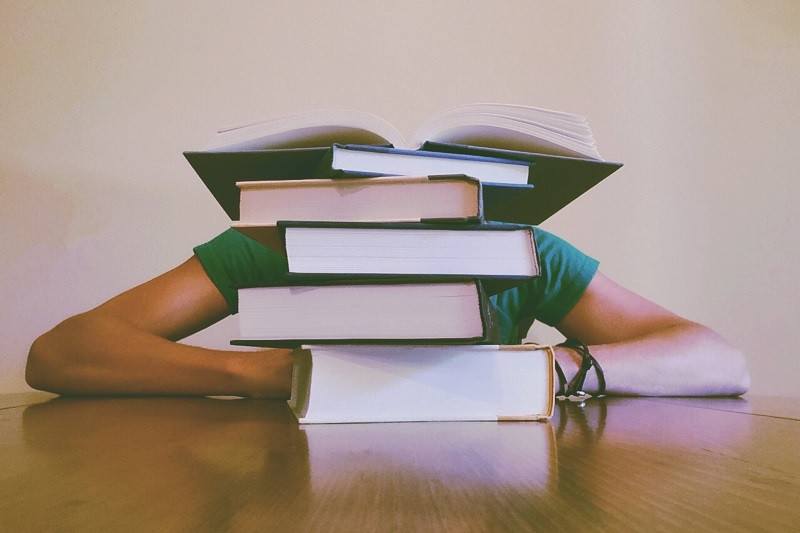
Sometimes it happens to us that things that we used to do at full speed now take twice as long and, on top of that, poorly. It is not difficult to concentrate and we even have some memory problems, why?
It may be that we are so, but so overwhelmed that this situation is taking its toll on us cognitively, evident at work, studies and even in leisure.
Anxiety and concentration problems are biologically related and below we are going to explain why, in addition to giving a few recommendations on what to do if we suffer from these two problems. Do not miss it!
Anxiety and concentration problems: how are they related?
We’ve all been going through a time when we can’t seem to concentrate in the slightest. Our concentration, attention, memory and decision making fail, preventing us from having a normal day. We forget things as important as the pending doctor’s appointment, the credit card number or that we had the stove on making a pot of coffee.
One of the possible causes behind problems with concentration and other executive functions is anxiety. We often underestimate the impact that this psychological state has on our brain, causing us to, despite suffering from it, not act to deal with it conveniently or in time. While it is true that concentration and memory problems can have various origins, we should never underestimate the effect that psychological states such as depression, anxiety and stress have on our cognitive abilities.
Anxiety is an emotion that, to the right extent, it is adaptive. Being anxious is synonymous with being expectant, prepared to face a possible threat and flee if we can. This emotion amplifies our capacity for attention and has the advantage that it helps us protect our physical and psychological integrity. However, if it reaches high levels and becomes chronic, it becomes a harmful companion, an emotion that attracts mental disorders and psychological problems.

How do I know if I suffer from lack of concentration due to anxiety?
It may seem counterintuitive, but there are many times that it is difficult for us to see that we have such anxiety that we do not even realize. Yes, it is curious that a state that makes us constantly worry, thinking about what can go wrong, becomes so high that we do not even realize that we present it. It is essential to differentiate when we suffer from concentration problems due to anxiety or other problems, since the origin is different and therefore the way of addressing it will also be different.
We can discover if we have concentration problems due to anxiety by looking at the following symptoms.
1. Mental fullness
Having the feeling of accumulating and procrastinating many tasks to do or thoughts in your head that prevent you from thinking clearly. It’s an eternal mental fog.
2. Small oversights
Forget some day-to-day detailsa sign that our memory is beginning to fail.
3. Difficulties enjoying tasks and hobbies
Trouble concentrating the tasks and hobbies that we like and used to enjoy before. For example, we lose the thread of the book we are reading or we do not realize the plot of the movie we are watching and we have to rewind to find out exactly what the movie is about.
4. Feeling of unreality
We begin to have a feeling of unreality. That is to say, we feel disconnected from everything that happens around us, even if it is an event that is pleasant to us. We feel like mere spectators of events in which we are supposed to be the protagonists or participate in them.
What is the cause?
In this specific case, by relating concentration problems to anxiety we can affirm that the cause here is, obviously, anxiety. However, what the deeper cause is is another question. It seems that The relationship between anxiety and concentration problems is especially strong in patients with generalized anxiety disorder.
This finding was in fact made in a 2017 research called “Difficulty concentrating in generalized anxiety disorder: An evaluation of incremental utility and relationship to worry.” Dr. Lauren Hallion’s group reached several conclusions about how concentration problems occur in patients with this anxiety disorder.
When anxiety persists in the individual’s life and becomes chronic, at the cortical level those who take control are the structures in charge precisely of emotional aspects. Regions such as the amygdala reduce the activity of the prefrontal areas, which are related to executive functions such as memory, reflection, problem solving, attention and concentration. That is why there would be such an intense relationship between anxiety and concentration problems.
In the particular case of generalized anxiety disorder, there is chronic worry. This causes the patient’s mental state to be one of high anxiety, an emotion which intensifies the activation of the so-called fear network, a neuronal circuit made up of the dorsal anterior cingulate cortex and the amygdala. This only generates greater concentration problems, less attention and difficulties in reflecting.
How to deal with these problems?
Both subclinical anxiety and anxiety disorders in general affect all areas of our lives.. Anxiety can cause problems with attention, memory and concentration, problems related to the cognitive aspects of our mind.
However, naturally, since it is a negative emotional state, it also brings us emotional problems that will be evident in areas of our lives such as work, family, studies, social life and leisure. Having too much anxiety only distorts our lives and with it we lose control of reality.
The most appropriate thing is to go to a professional specialized in anxiety disorders who will help us discover the deep origin of our altered emotional state. It is a step that, although it is difficult for us to take at first, brings with it many benefits since psychological therapy can help us acquire a more effective lifestyle to face unforeseen events and healthy coping strategies.
But, in addition to going to psychotherapy, we can introduce some healthy habits into our lives that will help us avoid both anxiety and concentration problems.
1. Dismantle your irrational ideas
As simple and easy as taking a pen and a piece of paper on which we will write down those irrational or non-functional thoughts that are blocking us, causing us a lot of discomfort.
The idea is that, by writing them down, we will try to write rationally what are the reasons why you believe that those thoughts are not plausible or if they are, what feelings they provoke in you.
2. Practice relaxation techniques and deep breathing
A classic way to deal with anxiety is to practice relaxation techniques and deep breathing. Psychologists themselves introduce this type of techniques in their clinical sessions because, although they are not a cure for anxiety disorders, they help reduce their symptoms and discomfort.
3. Exercise and stay active
The idea of practicing exercise to regulate our mood is a classic, and it is because it works. Performing physical activity with a certain frequency acts as a protective factor against all types of psychological problems, including anxiety and lack of concentration.
Sport is so beneficial because With it, the well-known endorphins are released, chemical substances that induce a state of relaxation and psychological well-being., in addition to reducing the perception of pain. They also reduce the feeling of being anxious.
But practicing sports also directly influences our ability to concentrate. In fact, it has been seen that people who do moderate intensity sports between 3 and 5 days a week have higher academic performance, linked to better concentration and retention capacity.
So, even without having problems with anxiety or concentration problems, practicing sports is a good ally for our performance.
Conclusion
In conclusion, it is worth saying that these practices, although they will help us, will not generate an immediate change nor will they make anxiety and concentration problems disappear as if by magic. Like everything in this life, it requires time for our mood and concentration to improve, and we also insist on going to a mental health professional to teach us how to deal with highly stressful events.
We must also accept that In life it is impossible to have control of absolutely everything.. Life is full of uncertainties and on more than one occasion things will happen that will upset us a little, because as human beings it is impossible for us to have certain events that play with our feelings. Furthermore, it takes a lot of time to change the pattern of our thoughts but, don’t worry, with time, perseverance and a little patience it’s a matter of improvement, don’t lose hope.








